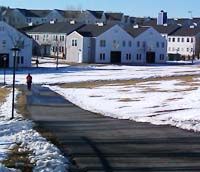For the past 10 days, I and my fellow teammates on the Hartford Volleyball team have been subjects of campus quarantine. Confined to our apartments for 14 days, the University has made sure to accommodate our needs by delivering our food, GrubHub orders, laundry, mail, and taking out our trash. Additionally, the apartments reserved specifically for quarantine in Quad 5 are probably the nicest on campus, each one featuring remote-controlled air conditioning units, new couches, a T.V., and a kitchen stocked with snacks and drinks.
By offering these amenities, it’s clear that the school has given significant thought as to how they would meet the needs and wants of quarantining students.
And yet, as a quarantined individual, will any amount of special treatment justify the assault that has been made on my autonomy?
Specifically, due to my roommates and I being “identified as someone at risk of direct exposure to someone to who has tested positive for COVID-19”, and categorized as “medium risk” individuals, we have received explicit instructions that we may not leave our quarantine space for 14 days. If going outside is a privilege, it is one that we have been temporarily denied.

University Dining Services employees deliver everything during quarantine, including food, laundry, and mail.
It matters not the reasons for which one of us may feel compelled to step outside for a few moments. It matters not whether we would do so intending to adhere to social-distancing and wear a mask.
Through our potential exposure to the virus, we have become a liability to the University. Because of this, we cannot be trusted to make personal decisions regarding our health and safety.
One of my roommates, Sara Gasparotto, discovered this when Public Safety paid her a visit after she went outside for a few minutes towards the beginning of her quarantine. “I had been feeling nauseous all day,” said Gasparotto. “I had vomited a few times and felt that the only thing that would make me feel better was walking outside for a few seconds and feel some fresh air.”
This was before our team was informed that the policy for quarantining students had changed from allowing regulated and minimal outdoor movement to none at all. “I just went out by myself with a mask on to an open area, didn’t see or talk to anybody, just trying to breathe” Gasparotto said.
It wasn’t but an hour later when a Public Safety officer came knocking on our door, responding to an anonymous tip through the LiveSafe App. The tip claimed that someone had seen Gasparotto walking outside her apartment. “I was a little bit scared,” said Gasparotto. “She [the officer] wasn’t mad, she just made me understand that I wasn’t supposed to leave…even if I was taking all the necessary precautions.”
During this conversation, Gasparotto was also informed that she was also not supposed to have her door open. Another quarantining student-athlete, Valerie Diede, received similar instruction when she had her own apartment door open a few nights ago. “An R.A. popped her head in our doorway and told us we ‘really should have our door closed’’ Diede claimed. “She said we could be infecting people walking outside because we weren’t wearing masks.”

The Village Apartments on campus where the quarantine spaces are set up.
These instances portray the seriousness with which the school regards the details of their quarantine policy. However, indeed there are exceptions. We, quarantining members of the volleyball team, have actually been permitted to go outside on several occasions since the start of our 14-day hiatus...per the school’s instruction. Specifically, we have been allowed to leave our apartments 3 times--only so that we may participate in the on-campus mandatory COVID testing that takes place below the University Commons. By requiring us to go outside, walk across campus, enter a building and then stand among other students in order to test, it seems the University demonstrates a blatant disregard for their own policy.
My teammate Greta DeGasper shared her thoughts on this practice. “It makes me frustrated that we are allowed to leave to do something that the school is asking us to do” she said. “It just makes me wonder if that doesn’t defeat the whole purpose.”
Additionally, each Hartford volleyball player has received 3 negative test results since the start of quarantine. We continue to prove ourselves free from any physical ailment. And yet, it is our mental health that remains at risk as we continue to be subject to the contradicting policies that govern our temporary indoor sentence.
Several of my teammates, myself included, have expressed these mental health concerns in the daily check-ins we have with health care workers. In response, these workers have recommended that we open our windows, do yoga and meditate, or have referred us to University counselors. And although they are understanding (“this is a difficult time for everyone”), they reiterate that we must stay inside to preserve the health of our campus community.
However, where is the concern for campus health when my roommate is warned against going outside for fresh air when she is feeling unwell? How am I supposed to believe in the mantra of "Hawks versus COVID" when LiveSafe's anonymous reporting feature makes it feel like "Hawk versus Hawk"? How can I be asked to trust the University when they don’t trust me to make personal decisions about my health or trust that I will respect their rules?
All in all, the health of a community begins with the health of individuals and, through my experience in campus quarantine, I believe it is in the latter that UHart falls short.